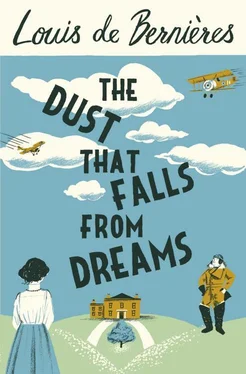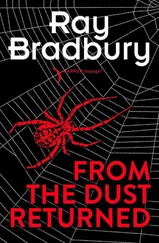They lunched at the Grand Hotel where, because the sole alternative was whale meat, they had to eat rabbit again, spent the afternoon drifting amongst the shops, and stopped twice for tea and cake, laughing and chattering the whole time, even though the cake had almost no sugar in it, and was hardly up to scratch. Certainly, her own daughters would have been much astonished to see their mother in such a frivolous, light-hearted and girlish mood.
It was at the second of these tea houses that an acquaintance of Mrs Henry Cowburn informed her in tones of breathless excitement that not only were Gosnold’s of Tontine Street selling fine lace at two shillings and three farthings a yard, but Stoke’s in the same street had a large supply of potatoes. ‘Oh, lace and potatoes,’ exclaimed Myrtle. ‘Goody-goody. How could one live without them?’ She turned to her friend. ‘Why don’t you go for a wander? There’s no point in both of us queuing for hours.’
‘There’s a little shop I’d like to visit in Dover Road,’ replied Mrs McCosh, who had never had to queue for vegetables in her life, and had no intention of starting now. ‘I’ll come and find you in half an hour and we can go to Gosnold’s together.’
‘I fear you might have to allow more than half an hour,’ said Myrtle. ‘The queues can become frightfully long. Luckily one always runs into friends, and it’s just like a party, but without the drinks and canapés, and with all sorts of delightful common people that one wouldn’t normally come across. It’s quite a leveller, I do declare.’
The friends separated, and Myrtle almost skipped to Stoke’s grocery shop, where she found a large, patient queue that included children playing football, babes in arms, dogs and even horses. There were very few young men, but plenty of elderly ones, all of them engaged in discussing how lovely the weather was, and saying how well it boded for Whitsun.
A series of explosions began in the near distance, coming ever nearer, and people reassured themselves that it was the Canadian soldiers getting into practice with their gunnery.
The twenty gigantic Gothas had set off with the intention of bombing London, but had been foiled by dense cloud. Although crudely built, they were magnificently invulnerable because they could fly higher than any Allied aircraft, and had a gun port in the rear that faced downwards so that it was impossible to attack them safely from below as one did with any other kind of bomber. None of the aircraft sent up against them were able to get within three thousand feet.
They were flying in diamond formation so as to maximise mutual defence, and intended to break it only to circle as they released their bombs. Their crews were brave and patriotic young men who loved the way that their engines sang, and deceived themselves into thinking that they were achieving military object-ives when they had no very clear idea of what was beneath them and no way of accurately aiming their bombs. The Kaiser had in any case decreed that it was legitimate to bomb civilians because this reinvention of total war would demoralise the population and so bring about an earlier peace, which is what any civilised person would want. The thought did not occur to him that this might provoke the British to retaliate in kind. As he greatly valued Kultur , he magnanimously forbade his bombers to attack ancient monuments, and as he valued his family he sentimentally forbade any attacks on the property of the royal family.
Frustrated by the failure to attack London, the twenty bombers turned for home, and followed the railway line to the Cinque Ports. They killed a sheep at Marden, another one at Mersham, and an eighteen-year-old girl at Ashford. A dud landed in an open grave at Belsingham, and eighteen Canadian soldiers perished at Shorncliffe Camp. They killed a middle-aged man in his garden in Cheriton, Dorothy Bergin, who was sixteen, and Francis Considine, who was five.
Myrtle thought the bombers looked beautiful as they circled above her. The sun was sparkling off their white wings, and everyone in the potato queue was craning their neck upwards and pointing, confident that the planes were theirs. They still thought that the explosions were from the training camp, even though they were now coming from the West End, and Radnor Park and Bouverie Road.
Myrtle watched a single bomb fall from one of the Gothas, the tiny black speck growing ever larger. She clutched her bag to her chest and held her breath as she and forty-four others were annihilated instantaneously, and seventeen more began their agonising and indecent journey into death.
Mrs McCosh had been watching the bombers like everyone else, thinking how pretty they were, and had not tried to take shelter. It was 6.22 when she saw the black speck leaving the Gotha, heard the crash of the explosion, and saw the column of debris and smoke rising up into the air over Tontine Street.
Carefully she put her bags and her shopping down in a doorway, and for the first time in many years began to sprint, shouting, ‘Myrtle! Myrtle!’ as she rushed round the corner from Dover Street.
What she beheld stopped her in her flight, and she walked slowly into the killing ground. A great sheet of flame from a gas main rose into the air with a whoosh, like the finishing touch to a portrait of Hell. There was a stink of blood and flame and explosive.
Mrs McCosh searched amongst the carnage. She pushed aside the rubble and severed limbs with her feet, peered beneath the mangled bodies of horses and into the tangled heaps of the dead. There was a woman, recently in pursuit of lace in Gosnold’s, with blood pouring from wounds in her head as she attempted first aid on those still living. Three of the dead lay in a cart, and there were many to whom humiliation had been added to obliteration because their clothes had been blown from their bodies.
Mrs McCosh tried to ignore the disassembled corpses of all the little children, because to have done otherwise would have been more than she could have borne. But then her gaze fell on the golden curls of Florence Norris, whose severed head lay gazing up at her from the step of the Brewery Tap in a puddle of blood. She was two years old. Tears came to Mrs McCosh’s eyes, and she bit her lip in rage and pity.
She found some bits and pieces that she thought might have belonged to Myrtle and gathered them in a heap.
The Canadian Red Cross ambulance arrived, then the firemen and the police, and she helped them wrap the limbs up in blankets for transportation to the hospital, and then, dishevelled, exhausted, weeping and drenched in blood, she went to fetch her bags, which had remained undisturbed on the doorstep where she had left them.
On the way back to Tontine Street she encountered Major Cowburn, who had been striding down Dover Street to see if he could be of any assistance. He had been enraged by a bomb that had left a large crater on his beloved golf course, and was wondering if Myrtle would allow him to re-enlist, if the army would accept a man who was too old, and always running for the lavatory.
He stopped suddenly in his tracks when he came face-to-face with Mrs McCosh, who was drenched in blood. ‘Oh my dear,’ he said.
Mrs McCosh put down her bags and silently clutched him, laying her head on his chest. He patted her back in embarrassment. She had about her the familiar smell of war. He murmured something inane that seemed to be all he could come up with.
Eventually Mrs McCosh managed to calm herself a little, and drew back slightly.
‘Oh, Henry, I am so sorry,’ she said.
‘Sorry? Sorry?’
‘I did my best, I really did. I looked everywhere, but I just couldn’t find it. I tried so hard, I did Henry. She was so pretty, oh, Henry, she was so pretty.’
‘I am sure you did,’ said Major Cowburn, realising that he would have to bide his time.
Читать дальше












